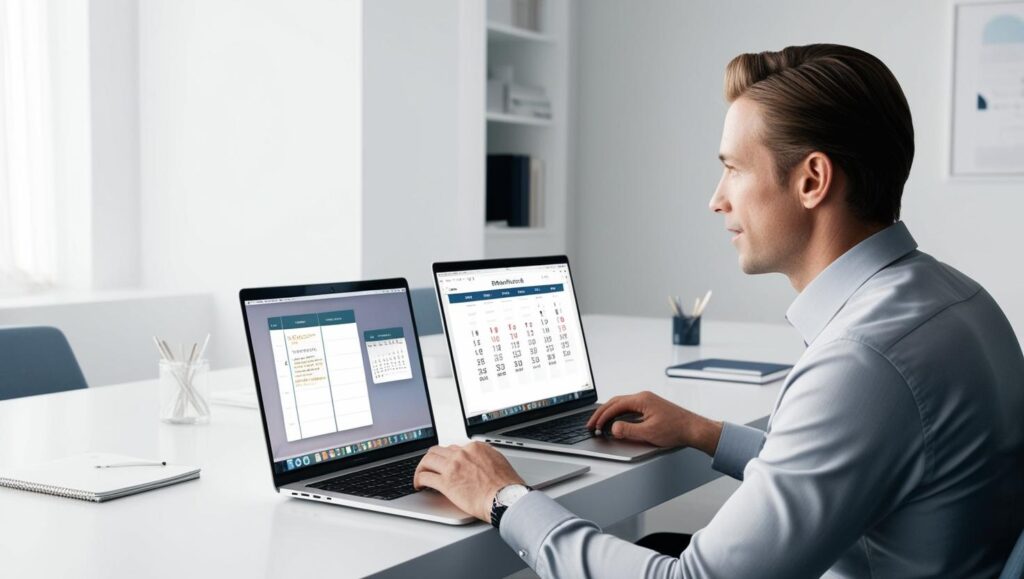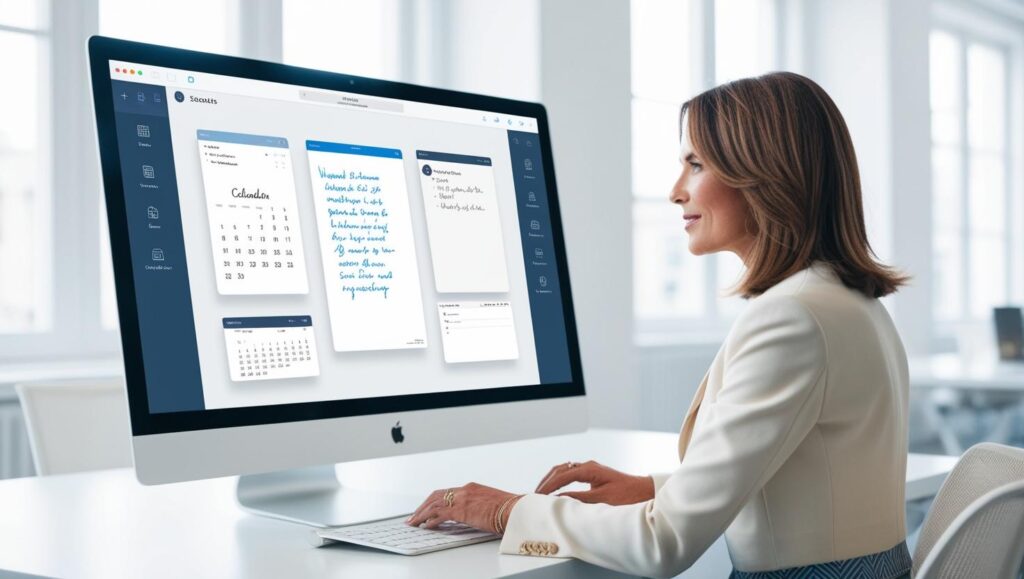
🔍 What Is Software for Everyday Tasks?
Software for everyday tasks refers to the essential tools we use daily to navigate personal and professional responsibilities on a computer. These are the apps that help us stay organized, connected, productive, and efficient—whether we’re working, studying, or managing household tasks.
Instead of downloading multiple standalone programs, today’s users lean toward all-in-one or well-integrated tools that can handle several needs at once: from note-taking and scheduling to email, budgeting, and file management.
The best part? Many of these tools are free, affordable, and designed to be easy to use for all skill levels.
💡 Why You Need Everyday Software Tools
Our lives are increasingly digital. From managing to-do lists and attending meetings to organizing family schedules or editing a quick photo, software plays a central role.
Here’s why choosing the right tools matters:
- Saves time by automating or simplifying repetitive tasks
- Boosts productivity with structured workflows
- Improves accuracy by tracking data and tasks reliably
- Supports multitasking across devices
- Reduces stress by keeping everything in one place
Whether you’re a remote worker, a student, a parent, or someone just looking to stay on top of things, the right software toolkit makes a noticeable difference.
🧰 Common Types of Software for Everyday Tasks
Everyday software usually falls into a few key categories. The best setups include tools from each of the following:
✅ Productivity Software
- Word processors (e.g., Google Docs, Microsoft Word)
- Spreadsheets (e.g., Excel, Google Sheets)
- Presentation tools (e.g., PowerPoint, Canva)
- PDF readers/editors (e.g., Adobe Acrobat, Foxit)
📆 Organization & Scheduling Tools
- Calendar apps (e.g., Google Calendar, Outlook)
- To-do lists and task managers (e.g., Todoist, Microsoft To Do)
- Note-taking apps (e.g., Notion, Evernote)
💬 Communication & Collaboration
- Email clients (e.g., Thunderbird, Gmail)
- Messaging tools (e.g., Slack, Microsoft Teams)
- Video conferencing (e.g., Zoom, Google Meet)
📁 File Management & Utilities
- File compression (e.g., WinRAR, 7-Zip)
- Backup software (e.g., SyncBack, Macrium Reflect)
- Cloud storage (e.g., Google Drive, Dropbox)
- Disk cleanup & performance tools (e.g., CCleaner)

🏆 Best All-in-One Software for Everyday Tasks
Let’s explore software suites that combine multiple tools into a unified experience—perfect for users who want simplicity without sacrificing functionality.
🖥️ 1. Microsoft 365 (Personal & Family Plans)
Microsoft 365 is still one of the most complete productivity suites. It includes Word, Excel, PowerPoint, Outlook, OneDrive, and Teams—all in one subscription.
Why It’s Great:
- Full offline access
- Real-time cloud sync with OneDrive
- Family plan supports up to 6 users
- Seamless calendar and email integration
Pricing: $6.99/month (Personal) or $9.99/month (Family)
🌐 2. Google Workspace (Free for Individuals)
Google’s suite of tools is ideal for personal users and small teams. All you need is a Gmail account.
Included:
- Docs, Sheets, Slides
- Google Calendar
- Keep (notes), Tasks
- Meet and Gmail
- Shared Google Drive
Why It Works:
Cloud-native, cross-platform, and easy to use. Accessible on any device.
📋 3. Notion
Notion blends task management, documentation, calendar views, and databases into one fully customizable space.
Best For:
- Daily planners
- Knowledge management
- Collaborative workspaces
- Habit tracking
Free for personal use / ~$8/month for teams
🛠️ 4. Zoho One
An all-in-one business software suite with apps for CRM, tasks, email, accounting, and document creation.
Ideal For: Small business owners and power users
Features: Over 40 integrated tools in one dashboard
Pricing: Starts at $45/user/month
📦 5. Trello + Power-Ups
While Trello itself is a task board, integrating it with Power-Ups (Google Drive, Calendar, Slack) makes it a flexible all-purpose tool.
Use Cases:
- Daily task tracking
- Grocery or shopping lists
- Travel planning
- Team project boards

🔄 Everyday Tasks You Can Automate with Software
With the right tools, you can automate small but repetitive tasks that save you minutes—or even hours—each day.
Here’s what can be automated:
- Email sorting: Filters, rules, spam control
- Backups: Daily or weekly file syncing to cloud
- Reminders: Recurring to-dos and calendar events
- Expense tracking: Budgeting apps categorize automatically
- Meeting scheduling: Shared availability calendars
Automation isn’t just for tech-savvy users. Most modern software has intuitive automation settings built in.
📊 Desktop vs Web-Based Software: Which Is Better for Daily Use?
| Feature | Desktop Software | Web-Based Tools |
|---|---|---|
| Access Speed | Faster with large files | Dependent on internet |
| Storage | Local or synced manually | Cloud storage by default |
| Updates | Manual or auto-update | Always up to date |
| Accessibility | Device-specific | Cross-device, anywhere |
| Security | More control locally | Encrypted, but cloud-based |
Best Combo: Use cloud tools for flexibility and lightweight tasks, and desktop apps for heavier workloads or offline use.
🔐 Are These Tools Safe for Everyday Use?
Most mainstream tools are extremely secure. To stay protected:
- Use two-factor authentication
- Keep software updated
- Avoid using unknown or cracked programs
- Back up critical data regularly
- Review app permissions, especially for mobile versions
Trusted providers like Microsoft, Google, Zoho, and Notion take data security seriously—always read their privacy policies before uploading sensitive files.
💸 How to Build a Powerful Toolkit on a Budget
You don’t have to spend a fortune to get reliable everyday tools. Here’s a simple combo of free or low-cost options:
| Task Type | Free Option | Paid Upgrade (Optional) |
|---|---|---|
| Word Processing | Google Docs | Microsoft Word (365) |
| Notes | Notion / Google Keep | Evernote Premium |
| Calendar | Google Calendar | Outlook (with 365) |
| Storage | Google Drive (15GB) | Dropbox / OneDrive |
| Cleaning Tool | CCleaner Free | Wise Care 365 Pro |
| Task Manager | Microsoft To Do | Todoist Pro |
You can easily build a full suite of software for everyday tasks without spending more than $10–$20/month—if anything.
✅ Final Thoughts: Build Your Digital Routine with the Right Tools
Managing everyday tasks doesn’t have to feel overwhelming. The right mix of software can turn chaos into clarity. Whether you’re scheduling your week, managing family errands, tracking goals, or staying connected with your team, a great toolkit brings structure, speed, and sanity to your routine.
Look for software that is intuitive, affordable, and adaptable to your lifestyle. You’ll not only save time—you’ll enjoy using your computer more than ever.
Simplify your day. One task at a time.